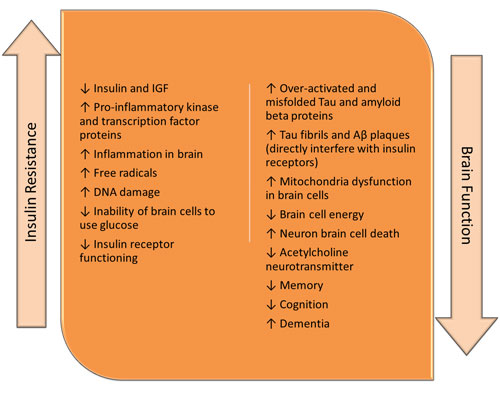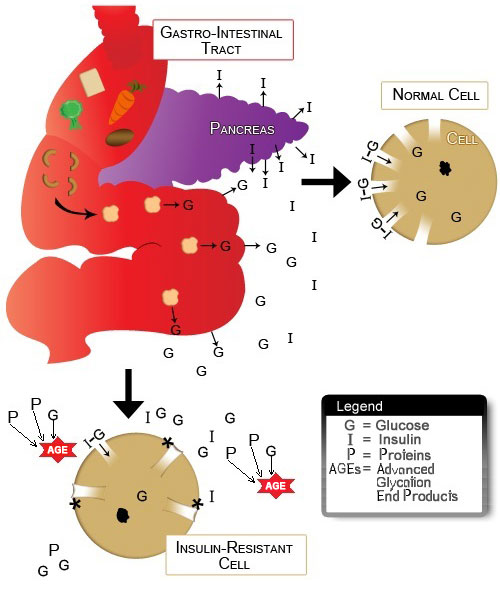The Connection between Alzheimer's Disease and Diabetes or Insulin Resistance

Both diabetes and insulin resistance have been linked to the development of Alzheimer's for decades. Statistics show increasing numbers of younger people developing type-2 diabetes and insulin resistance. This is alarming since it may also mean that that same group of people could be at risk of early-onset Alzheimer's disease. Fortunately turmeric compounds, including curcumin, may be able to help. (iv.56, 57)
As Alzheimer's progresses, insulin resistance is more pronounced. These conditions damage neuron brain cells that generate acetylcholine (ACh)-the neurotransmitter needed for learning and memory. It's still unclear whether diabetes and insulin resistance is a result or initial cause of all of the events that eventually destroy the brain cells that produce ACh. However, there's no doubt damage to insulin receptors, diabetes, and insulin resistance all contribute to the inflammation, free radical damage, and plaques in Alzheimer's disease. (iv.56)
In fact, evidence indicates that Alzheimer's disease is intricately tied to diabetes and insulin resistance. This has led some researchers to suggest Alzheimer's could be called type 3 diabetes. (iv.56, 57)
Experts say the following could help lower the risk of both diabetes and Alzheimer's disease: (iv.56, 57)
- Keeping blood sugar at normal levels.
- Protecting insulin receptors with substances such as turmeric and its compounds (especially curcumin).
- Diet and lifestyle improvements.
The Importance of Insulin and Insulin Receptors
Medical scientists used to think insulin for brain cells only came from the pancreas. Neuron brain cells have lots of insulin receptors for insulin to bind to. This seemed to make it clear that neurons functioned like other cells, using insulin to help absorb glucose. (iv.56)
However, new information about neurons has emerged: (iv.56)
- Neuron and glial brain cells also produce insulin.
- They are also able to absorb blood sugar without using insulin.
So why do neurons need insulin and insulin receptors? Experts speculate that the brain needs the hormone and its relative-insulin-like growth factor (IGF)-for cell growth. Further evidence indicates that insulin receptors play a role in helping keep neurons and their synapses healthy and able to function properly. Studies also show that reduced levels of insulin and IGF and dysfunctional receptors are linked to many of the cellular events in Alzheimer's disease: (iv.56, 57)

Increased Insulin Resistance and Decreased Brain Function

Insulin Resistance and AGEs
High Blood Sugar Makes Toxic Clumps in the Brain
Insulin helps transport glucose across the cell membrane. It does so by binding to insulin receptors, which are specific proteins in cell membranes. Neurons typically have plenty of insulin receptors. (iv.56, 58)
Damaged insulin receptors and/or not enough insulin decreases the amount of glucose absorbed by cells. At the same time, this leaves too much glucose in the blood. Excess blood sugar and its metabolite methylglyoxal bind to proteins and create advanced glycation end products (AGEs): (iv.56, 57)
AGEs form toxic clumps in the brains blood vessels (as it does elsewhere in the body). Animal studies show that diabetes leads to more AGE deposits in the brain and earlier onset of Alzheimer's disease than in non-diabetics. Other research suggests AGE deposits make it harder for the body's immune system to get rid of amyloid-beta proteins. (iv.56, 57)
Join the 1000s of People Who Are Discovering the Benefits of Turmeric.

Healthceuticals® Turmeric Curcumin Complex
100% Certified
Organic ingredients
- Organic Turmeric Extract - standardized to 95% curcuminoids.
- Organic Whole Turmeric - provides full spectrum antioxidant, anti-inflammatory turmeric benefits, including turmerones and numerous vitamins, minerals, and phytonutrients
- Organic Black Pepper Extract - standardized to 95% piperine; dramatically enhances bioavailablity.
- Organic Phospholipids - markedly improve absorption.
- Organic Ginger - works synergistically with turmeric to provide more powerful benefits.
- Absolutely FREE of potentially harmful additives and fillers such as magnesium stearate.




